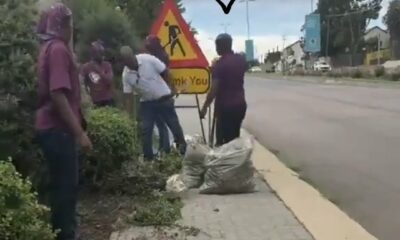News
“They Are Attacking Our State”: Cachalia’s Stern Warning to WC Gangs as Courtroom Killings Spike

“They Are Attacking Our State”: Cachalia’s Stern Warning to WC Gangs as Courtroom Killings Spike
The brazenness has reached a new, terrifying level. Gang violence in the Western Cape has moved from the streets into the very buildings designed to uphold justice. In the wake of a series of execution-style killings inside court precincts, the acting police minister has drawn a line in the sand, issuing a stern warning to the syndicates he believes are waging war on the state itself.
Acting Police Minister Feroz Cachalia’s message is clear: the state is coming for you, and it will use every tool at its disposal.
The Unacceptable Target: Courtrooms Under Fire
The catalyst for this hardened stance is a sequence of attacks that have shattered the notion of safe spaces. The justice system has been directly targeted:
-
In April, a man was gunned down inside the Wynberg Magistrate’s Court.
-
About a week ago, another killing occurred at the Mitchells Plain court.
-
This past Friday, a shooting erupted at the Athlone Magistrate’s Court.
This isn’t just random violence; it’s a calculated assault on the symbol of law and order. As Western Cape Judge President Nolwazi Mabindla-Boqwana starkly put it, “The attacks in the court precinct are attacks against our democracy; they are attacks against the administration of justice.”
A New Enemy: It’s Not “Old-Style Gang Violence”
After meeting with senior police officials in the province, Cachalia reframed the challenge. This is not, he insists, the gang warfare of the past.
“My view is that it’s not just old-style gang violence. I think this is organised crime,” he stated, signalling a major shift in how the government perceives the threat. He described an “evolution” of gangs into sophisticated, “transnational” syndicates.
“These are businesses accumulating large amounts of money, they have access to guns, and they are supplying drugs… This is the kind of crime that affects our national security.”
This classification is crucial. It moves the response from local policing to a national security imperative, unlocking a broader arsenal of resources.
The Multi-Pronged Strategy: More Than Just Bullets
Cachalia’s plan goes beyond simply putting more officers on the beat. He outlined a comprehensive strategy that aims to hit gangs where it hurts: their finances and their assets.
The plan includes:
-
Enhanced, intelligence-driven policing to target kingpins, not just foot soldiers.
-
Roping in the South African Revenue Service (SARS) to investigate and dismantle the financial structures of these syndicates.
-
Deploying the Asset Forfeiture Unit (AFU) to seize the wealth and properties accumulated through illicit means.
“I’m going to be pulling out all the stops,” Cachalia warned. “Unless I see a retreat of these drug lords and gangs, they’ve got to step back, stop the violence, otherwise they’re going to force us into a situation where we have to take more and more action against them.”
The Army Question: A Door Left Slightly Ajar
One option, however, seems to be off the table for now. Despite the escalating crisis, Cachalia confirmed that discussions about deploying the South African National Defence Force (SANDF) had concluded it was “not a good idea.” For the time being, the state will rely on its law enforcement and financial instruments to wage this war.
The message from the highest levels of government is no longer one of mere concern, but of confrontation. The gangs have stepped out of the shadows and into the courtroom, and the state is now promising a response that matches the audacity of the threat.
{Source: TheCitizen}
Follow Joburg ETC on Facebook, Twitter , TikTok and Instagram
For more News in Johannesburg, visit joburgetc.com


























